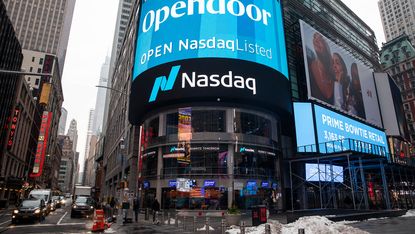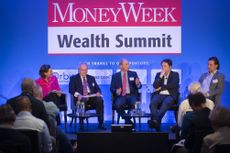Frisby’s forecasts – what does 2021 have in store for investors?
Dominic Frisby gazes into his crystal ball and makes his predictions for the markets in the year ahead.


Good morning and welcome to the new year – same as the old year, only with a different handle.
Today, as is tradition in the first Money Morning of the year, we venture into the attic, rummage around, find our crystal ball, dust it down and make ten investment predictions...
Ten sure things* for 2021 (*they’re definitely not sure things)
We make these forecasts with the usual disclaimer: predictions are a mug’s game.
Subscribe to MoneyWeek
Subscribe to MoneyWeek today and get your first six magazine issues absolutely FREE

Sign up to Money Morning
Don't miss the latest investment and personal finances news, market analysis, plus money-saving tips with our free twice-daily newsletter
Don't miss the latest investment and personal finances news, market analysis, plus money-saving tips with our free twice-daily newsletter
1. Covid-19: the crisis is here to stay: As you will all know from having read my magnum opus Daylight Robbery: How Tax Shaped our Past and Will Change our Future, one of the recurring themes of history is that governments extend their taxation and controls during a crisis in a way that they never could in peacetime.
Were it not for the Napoleonic and World Wars, for example, we would never have had to pay as much income tax as we do. Income tax in the US was first imposed in the Civil War, yet it never touched the lives of ordinary Americans until the Revenue Act of 1942, passed to fund the US effort in World War II.
Yet when the crisis has passed, the taxation and controls never return to the levels they were at before the crisis began. When WWII ended, income tax for everyman never went away, because now there was the rebuilding effort. The Institute of Fiscal Studies calls this “the ratchet effect”.
Having won the general election of 1841 campaigning against income tax, British prime minister Sir Robert Peel re-introduced it to the UK in 1842 as a “temporary measure” to fund a deficit emergency. Today, 178 years later, that temporary measure remains. But back then, the tax only affected higher earners. It took another crisis, World War I, to bring the tax to ordinary folk.
Quantitative easing (QE), a form of inflation (in that it inflates the money supply) was introduced as a temporary measure to address the banking crisis of 2008. Nobody voted for it. Without the Global Financial Crisis, it is doubtful whether it would ever have been allowed. Today, 12 years on, it is normal.
This is a long way of getting to my first prediction. We will never go back to the freedoms we enjoyed before Covid-19 came along. The precedent of the government being able to close down the economy has been set. This is the new normal.
Whether vaccines work or not, Covid is now part of our lives. New strains of the virus will come along, some more dangerous, some less. But control of movement, testing, tracking, tracing, quarantining, vaccination, bail-out money, furlough (all steps towards Universal Basic Income) even lockdowns – these are the new normal.
Airports never went back to what they were before the September 11th attack in 2001. Same applies.
Those who optimistically look forward to getting back to how we were are going to be disappointed.
2. Inflation: expect even more of it: I’ve noticed on social media a large number of people posting their investment returns for 2020. These returns have, largely, been excellent. We are all geniuses in a bull market. Before we run out and congratulate ourselves, it must be remembered that money printing this year has been extraordinary. The result has been extraordinary returns, and speculative bubbles a-plenty.
Tesla was up 750%. Peloton 435%. Zoom 400%. Bitcoin 300%. Amazon 75%. The Nasdaq 50%. Gold 25%. The S&P 500 18%.
Base metals had a great year. The UK housing market is at all-time highs.
Oil was down 20%, while commercial property and the high street took a battering. But funny money has softened that battering.
The US stockmarket is deemed as important to the US economy as the housing market is the UK’s. Both will be protected at all costs. Wall Street is addicted to stimulus. The UK housing market is protected by low rates. It might seem absurd that both should be more valuable than they were before the decimation of Covid. The reason is funny money.
This inflation, of course, does not show up on official measures, because official inflation only measures consumer prices, which, in a competitive market, tend to come down in price as productivity improves.
Is 2021 the year that the economy rids itself of its drug dependency? Nope. Extend and pretend continues. Asset prices go higher.
The anti-inflation narrative may get more pronounced in 2021 as more people cotton onto the racket, but the funny money is still going to push multiple asset prices higher.
A lot of people have saved a lot of money this year – they are still being paid, but they are not spending as much on travel, clothing, entertainment, eating out. That’s a lot of savings waiting to be invested. That’s going to push asset prices higher too.
3. Bitcoin: a rollercoaster ride towards $50k: One of the biggest beneficiaries of said inflation will be bitcoin. The new vogue for corporate cash to be held in bitcoin to escape cash’s annual 15% loss of purchasing power continues. Bitcoin goes north of $50,000 as a result. But 2021 also sees one of bitcoin’s triennial, monster 50%+ corrections.
4. Gold: new highs ahead: Gold breaks out to new highs, probably in the first half.
5. US stocks: new records beckon: The S&P 500 breaks above 4,000 for the first time.
6. Silver: another run at the moon – and back: Is this the year that silver has another run? Heck, why not. Silver goes back and retests its old highs at $50 an ounce. But it doesn’t get through because... manipulation.
7. UK property: house prices up, office prices not so much: The UK housing market continues its relentless grind higher. The alienation of the younger generation through unaffordable housing resurfaces as a political issue. The root cause – funny money – is not addressed. We probably get a change of housing minister, bringing the total to 19 since 1997.
The commercial property sector faces its day of reckoning in the spring, especially in the hospitality sector. Hipsters start to occupy vacant commercial properties in city centres and turn them into live-work spaces, though the older, middle-class exodus to the country continues.
8. Oil: the return of fossil fuels: Brent goes to $70.
9. A wealth tax in all but name:The chancellor raises capital gains tax. It is “only fair” to do so. Rates get closer in line with income tax.
10. Sterling: back in the game: The pound goes above $1.40 and retests $1.45 for the first time since you-know-what.
11. Your Bruce-y bonus sports prediction: Man City win the League. Fulham, West Brom and Sheffield United go down.
So there you go. That’s what 2021 has in store for us.
Now for the actual events – which always mess up the predictions.
Daylight Robbery – How Tax Shaped The Past And Will Change The Future is now out in paperback at Amazon and all good bookstores with the audiobook, read by Dominic, on Audible and elsewhere.
Dominic Frisby (“mercurially witty” – the Spectator) is the world’s only financial writer and comedian. He is MoneyWeek’s main commentator on gold, commodities, currencies and cryptocurrencies. He is the author of the books Bitcoin: the Future of Money? and Life After The State. He also co-wrote the documentary Four Horsemen, and presents the chat show, Stuff That Interests Me.
His show 2016 Let’s Talk About Tax was a huge hit at the Edinburgh Festival and Penguin Random House have since commissioned him to write a book on the subject – Daylight Robbery – the past, present and future of tax will be published later this year. His 2018 Edinburgh Festival show, Dominic Frisby's Financial Gameshow, won rave reviews. Dominic was educated at St Paul's School, Manchester University and the Webber-Douglas Academy Of Dramatic Art.
You can follow him on Twitter @dominicfrisby
-
 Private school fees soar and VAT threat looms – what does it mean for you?
Private school fees soar and VAT threat looms – what does it mean for you?Rising private school fees could see more than one in five parents pull their children out of their current school. Before you remortgage, move house or look to grandparents for help, here’s what you need to know.
By Katie Williams Published
-
 Best and worst UK banks for online banking revealed
Best and worst UK banks for online banking revealedWhen it comes to keeping your money safe, not all banks are equal. We reveal the best and worst banks for online banking when it comes to protecting your money from scams
By Oojal Dhanjal Published
-
 Halifax: House price slump continues as prices slide for the sixth consecutive month
Halifax: House price slump continues as prices slide for the sixth consecutive monthUK house prices fell again in September as buyers returned, but the slowdown was not as fast as anticipated, latest Halifax data shows. Where are house prices falling the most?
By Kalpana Fitzpatrick Published
-
 Rents hit a record high - but is the opportunity for buy-to-let investors still strong?
Rents hit a record high - but is the opportunity for buy-to-let investors still strong?UK rent prices have hit a record high with the average hitting over £1,200 a month says Rightmove. Are there still opportunities in buy-to-let?
By Marc Shoffman Published
-
 Pension savers turn to gold investments
Pension savers turn to gold investmentsInvestors are racing to buy gold to protect their pensions from a stock market correction and high inflation, experts say
By Ruth Emery Published
-
 Where to find the best returns from student accommodation
Where to find the best returns from student accommodationStudent accommodation can be a lucrative investment if you know where to look.
By Marc Shoffman Published
-
 Best investing apps
Best investing appsWe round up the best investing apps. Looking for an easy-to-use app to help you start investing, keep track of your portfolio or make trades on the go?
By Ruth Emery Last updated
-
 The world’s best bargain stocks
The world’s best bargain stocksSearching for bargain stocks with Alec Cutler of the Orbis Global Balanced Fund, who tells Andrew Van Sickle which sectors are being overlooked.
By Andrew Van Sickle Published
-
 Revealed: the cheapest cities to own a home in Britain
Revealed: the cheapest cities to own a home in BritainNew research reveals the cheapest cities to own a home, taking account of mortgage payments, utility bills and council tax
By Ruth Emery Published
-
 UK recession: How to protect your portfolio
UK recession: How to protect your portfolioAs the UK recession is confirmed, we look at ways to protect your wealth.
By Henry Sandercock Last updated